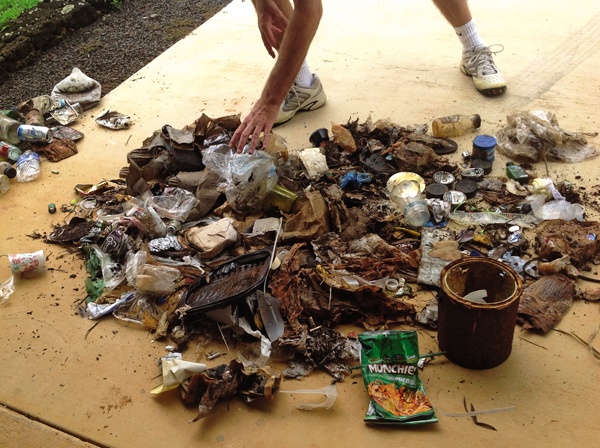LIHUE — Ohio native Kathleen Cooper moved to Kauai two years ago.
She realized soon after the move that there was more to Kauai’s landscape than the beach, mountain and waterfall-paradise the rest of the world associates with the island.
Namely, trash. And lots of it.
“It’s just really horrible,” Cooper said. “I don’t understand why people think it’s OK to litter this beautiful island.”
She and her boyfriend have gotten in the habit of filling a bag or two of trash during their half-mile walks from their Kalaheo home to Kukuiolono Park.
“What are the rules or restrictions? Does anybody ever enforce it?” Cooper asked regarding the littering.
As it turns out, there are laws, fines and active enforcement in place. And there are several private and nonprofit organizations, besides county and state government, trying to keep the Garden Isle from becoming garbage island.
But trash keeps finding its way to roads, parks, oceans and rivers rather than going to the landfill or recycling stations.
So, who is in charge of dealing with trash in public places?
Highway maintenance, including litter control, is the jurisdiction of the state Department of Transportation, according to county spokeswoman Sarah Blane. County roads, she said are maintained by the county’s Public Works Roads Division.
Baseyard crews from Hanalei, Kapaa and Hanapepe assist with litter control as part of their overall roadside maintenance program, which services all county roads islandwide, Blane said.
“For the most part, road maintenance is handled on a routine schedule, but crews will also respond to requests from the community regarding pot holes, dead animals, overgrown brush and other road-related complaints,” she said.
When it comes to trash on Kauai’s highways, some spots are more popular than others, too.
DOT spokeswoman Patricia Wong said several spots are more prone to littering, including stretches of Kuhio Highway near Kealia Beach and Kawaihau Road, and a portion of Kaumualii Highway near Kekaha Landfill.
About two or three times a month, DOT crews comb state highways picking up trash, with the aid of a litter wagon, Wong said. Their range is islandwide.
Highway cleanups also get help from the state’s Adopt-A-Highway program, a partnership with businesses, associations and nonprofits. Every three months, volunteers wearing bright orange shirts walk through an adopted portion of the highway and stuff trash inside bright orange plastic bags, which are later picked up by DOT.
Yet, one volunteer agreed with Cooper’s assessment that trash seems to be commonplace.
“There is littering everywhere,” said Judy Dalton, outings chair of the Sierra Club, Kauai Group.
And it takes a lot of work to combat.
Dalton said for the past 20 years, the Sierra Club adopted the first three or four miles of the Waimea Canyon Road, leading to Kokee State Park on Kauai’s Westside. Among the piles of trash picked up by members of the nonprofit, there are many plastic bottles and cigarette butts, she said.
But the Sierra Club goes beyond the road overly traveled. Once a month, they hit one of Kauai’s pristine beaches — not to look for shells, but for trash.
“We have been doing beach cleanups for more than 20 years on a regular basis,” Dalton said.
Sierra Club wants to make sure marine life don’t ingest plastic and other debris, she said. Saturday, Sierra Club will join efforts with Malama Mahaulepu and the Surfrider Foundation to clean up Mahaulepu Beach on Kauai’s South Shore.
Additionally, about once or twice a year, Sierra Club does river cleanups aboard kayaks, usually at Hanalei River but sometimes at Wailua River.
“It’s a beautiful island, and we want to keep it as beautiful as we want it to be,” Dalton said.
Meanwhile, the county law can fine litterbugs $250 per violation. State law allows fines to climb as high as $1,000. The county couldn’t provide the number of tickets they’ve issued in recent years.
Cooper said she recently spent three months on the Mainland. When she resumed her regular walks to Kukuiolono Park, she said she picked up a large amount of trash accumulated on Puu Road while she was away.
Less than a week later, there was all new trash on her favorite walking path.
Cooper said she had a number of guests here visiting from the Mainland, and the last ones made comments about the trash.
“They stopped at a couple of different cemeteries while they were here, and they were appalled,” she said. “They said it looks like we use our cemeteries as a dump, and people don’t seem to respect the dead here.”
Cooper said she doesn’t want her guests to have negative comments on the paradise she has been raving about.
“It’s not really what we want,” she said.
• Léo Azambuja, staff writer, can be reached at 245-0452 or lazambuja@thegardenisland.com




